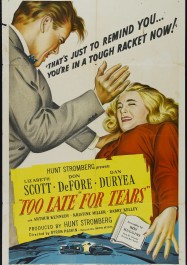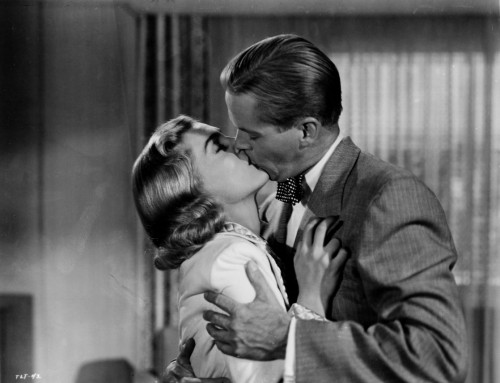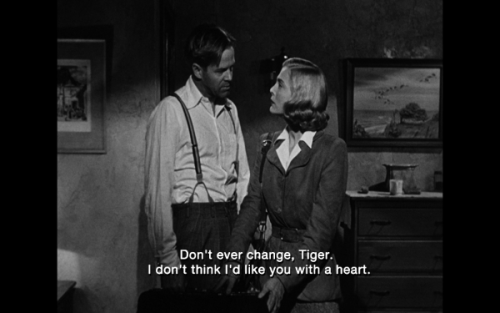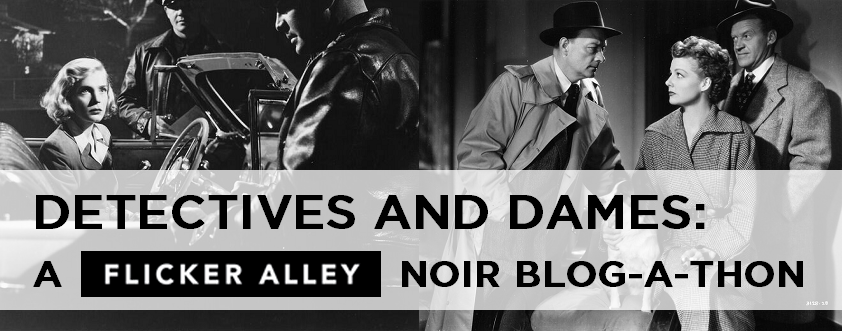Flicker Alley is proud to present the following essay by Elyce Rae Helford, written for Detectives and Dames: A Flicker Alley Noir Blog-a-Thon! Too Late for Tears (1949) is available on Blu-ray/DVD May 10! Pre-order today!
Elyce Rae Helford, Ph.D., is professor of English at Middle Tennessee State University. She is author of a forthcoming book on director George Cukor (Wayne State University Press) and editor of the soon-to-be-released The Woman Fantastic in Contemporary Media Culture (University of Mississippi Press, 2016). She also frequently writes for ScreenPrism.com. More information at ElyceHelford.com.
Note: This essay contains spoilers for Too Late for Tears.
 Dan Duryea is a staple of early noir, playing diverse yet always engaging secondary roles, from a sleazy blackmailer in Lang’s Woman in the Window (1945) to a duped husband in Mann’s The Great Flamarion (1945). He’s head hoodlum in Siodmak’s Criss Cross (1949) and even fills leading man shoes as a wrongly accused musician in the lesser-known Black Angel (1946). To many noir fans, however, Duryea’s most memorable role may be that of sleazy homme fatale Johnny in Fritz Lang’s Scarlet Street (1944), a petty criminal who keeps his girl Kitty (Joan Bennett) on a short leash through threats and slaps that she can’t seem to get enough of. Taken together, a viewer of Duryea in 1949’s Too Late for Tears might expect more of the same, especially if drawing conclusions from the film’s original publicity posters and shots, which grossly misrepresent the film’s atypical and mesmerizing challenge to expected gender roles.
Dan Duryea is a staple of early noir, playing diverse yet always engaging secondary roles, from a sleazy blackmailer in Lang’s Woman in the Window (1945) to a duped husband in Mann’s The Great Flamarion (1945). He’s head hoodlum in Siodmak’s Criss Cross (1949) and even fills leading man shoes as a wrongly accused musician in the lesser-known Black Angel (1946). To many noir fans, however, Duryea’s most memorable role may be that of sleazy homme fatale Johnny in Fritz Lang’s Scarlet Street (1944), a petty criminal who keeps his girl Kitty (Joan Bennett) on a short leash through threats and slaps that she can’t seem to get enough of. Taken together, a viewer of Duryea in 1949’s Too Late for Tears might expect more of the same, especially if drawing conclusions from the film’s original publicity posters and shots, which grossly misrepresent the film’s atypical and mesmerizing challenge to expected gender roles.
 Duryea plays Danny Fuller, the violent petty criminal whose cash ends up in the lap of Jane Palmer (Lizabeth Scott) instead of his own at the beginning of the film. When they meet for the first time, Danny is all business, tough and crude, determined to get what belongs to him. He menaces effectively, and in a more typical noir, Jane would be the victim, destroyed or seduced by his sleazy “charm.”
Duryea plays Danny Fuller, the violent petty criminal whose cash ends up in the lap of Jane Palmer (Lizabeth Scott) instead of his own at the beginning of the film. When they meet for the first time, Danny is all business, tough and crude, determined to get what belongs to him. He menaces effectively, and in a more typical noir, Jane would be the victim, destroyed or seduced by his sleazy “charm.”
But Too Late for Tears is distinctive in the pair’s relationship, for Jane is not a naïve housewife dazzled by dough. She is a tough, crude gal herself, and more than a match for Danny…not to mention her two husbands. It is fascinating to watch as Jane shifts the tension and the terms of her relationship with Danny. The game between them hinges on who will blink first. How far will Danny go for his money, and how far will Jane go to keep it? The answer is found in murder. Danny is a criminal, and he seems willing to kill for his cash, but Jane outdoes him. She is willing to murder even when unnecessary. She’s after more than money; she seeks her freedom to be both wealthy and entirely in control of her life. And she’s willing to use anyone to keep her secrets hidden, including Danny.
 It’s clear in their relationship that Danny is awed by Jane, first impressed and then incredulous at just how much colder and more calculating she is than he. Unlike the malleable Kitty in Scarlet Street whom Duryea’s Johnny nicknames “Lazy Legs” for her lack of work ethic, Jane merits the moniker of “Tiger” from Danny. She is a dangerous predator indeed. Jane is the most vicious of femmes fatales, a woman that a low-rent criminal can worship or cringe from. “Don’t ever change, Tiger,” the overwhelmed Danny declares. “I don’t think I’d like you with a heart.” When Danny utters these words, she’s already shattered his worldview, where men dominate women. He’s become an unshaven drunk, apprehensive of what Jane will do next, but he knows he lacks the strength to resist.
It’s clear in their relationship that Danny is awed by Jane, first impressed and then incredulous at just how much colder and more calculating she is than he. Unlike the malleable Kitty in Scarlet Street whom Duryea’s Johnny nicknames “Lazy Legs” for her lack of work ethic, Jane merits the moniker of “Tiger” from Danny. She is a dangerous predator indeed. Jane is the most vicious of femmes fatales, a woman that a low-rent criminal can worship or cringe from. “Don’t ever change, Tiger,” the overwhelmed Danny declares. “I don’t think I’d like you with a heart.” When Danny utters these words, she’s already shattered his worldview, where men dominate women. He’s become an unshaven drunk, apprehensive of what Jane will do next, but he knows he lacks the strength to resist.
To be clear, I’m not calling the emasculation of Duryea’s Danny a championing of Scott’s femme fatale. Even more than Walter Neff (Fred MacMurray) in Double Indemnity (1944) with Phyllis Dietrichson (Barbara Stanwyck), Danny is out of his depth and foolish enough to be surprised by it. Like all noir black widows, Jane shows that women can be strong and active in classic Hollywood film, but she is neither sympathetic nor a role model. Film noir is a genre that champions no one, although we may get a thrill when we see a tough gal put a seemingly tough guy to shame. Too Late for Tears definitely offers that thrill.

